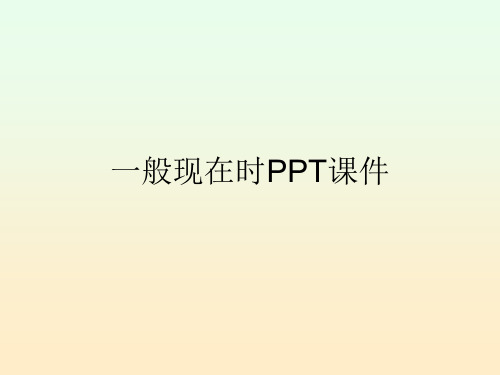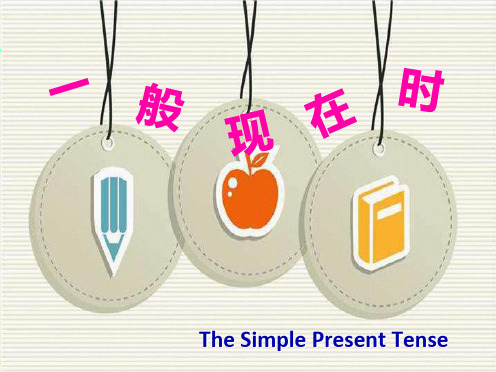一般现在时PPT课件
合集下载
《一般现在时讲解》课件

一般现在时可以用来描述当前的情况或状态,例如“我现在很开心”、“她现在 是一名学生”等。这种时态强调的是当前的情况或状态,而不是过去或未来的变 化。
表示客观事实或普遍真理
总结词
描述不受时间影响的客观事实或普遍真理。
详细描述
一般现在时可以用来描述不受时间影响的客观事实或普遍真理,例如“地球是圆的”、“水在100摄氏度下沸腾 ”等。这种时态强调的是事实的普遍性和客观性,不会因为时间而改变。
I eat an apple every day. (我每天吃 一个苹果。)
结构
一般现在时的基本结构是“主语+谓 语+(宾语)+(其他成分)”,其中 谓语动词以原形或第三人称单数形式 出现。
一般现在时的特点
01
02
03
强调现在
一般现在时强调当前时间 点,表示动作或状态正在 发生或存在。
普遍性
一般现在时用于描述普遍 存在的真理、事实或习惯 性行为,不受时间限制。
总结词
动词形式不同
详细描述
一般现在时的动词形式为原型,而一般将 来时的动词形式需要用will+动词原型。
与现在进行时的对比
总结词
动作状态不同
详细描述
一般现在时表示现在的动作或状态,强调动作的持续性 ;而现在进行时表示正在进行的动作或状态,强调动作 的进行过程。
总结词
用法侧重不同
详细描述
一般现在时更侧重于描述习惯性、经常性的动作或状态 ,而现在进行时则侧重于描述当前正在发生的动作或状 态。
一般现在时的用法
表示习惯性或经常发生的动作
总结词
描述日常生活中的常见行为或习惯。
详细描述
一般现在时用于描述日常生活中的常见行为或习惯,例如“我每天早上起床” 、“他每周去健身房锻炼”等。这种时态强调行为的频繁性或习惯性,而不是 特定的一次性事件。
表示客观事实或普遍真理
总结词
描述不受时间影响的客观事实或普遍真理。
详细描述
一般现在时可以用来描述不受时间影响的客观事实或普遍真理,例如“地球是圆的”、“水在100摄氏度下沸腾 ”等。这种时态强调的是事实的普遍性和客观性,不会因为时间而改变。
I eat an apple every day. (我每天吃 一个苹果。)
结构
一般现在时的基本结构是“主语+谓 语+(宾语)+(其他成分)”,其中 谓语动词以原形或第三人称单数形式 出现。
一般现在时的特点
01
02
03
强调现在
一般现在时强调当前时间 点,表示动作或状态正在 发生或存在。
普遍性
一般现在时用于描述普遍 存在的真理、事实或习惯 性行为,不受时间限制。
总结词
动词形式不同
详细描述
一般现在时的动词形式为原型,而一般将 来时的动词形式需要用will+动词原型。
与现在进行时的对比
总结词
动作状态不同
详细描述
一般现在时表示现在的动作或状态,强调动作的持续性 ;而现在进行时表示正在进行的动作或状态,强调动作 的进行过程。
总结词
用法侧重不同
详细描述
一般现在时更侧重于描述习惯性、经常性的动作或状态 ,而现在进行时则侧重于描述当前正在发生的动作或状 态。
一般现在时的用法
表示习惯性或经常发生的动作
总结词
描述日常生活中的常见行为或习惯。
详细描述
一般现在时用于描述日常生活中的常见行为或习惯,例如“我每天早上起床” 、“他每周去健身房锻炼”等。这种时态强调行为的频繁性或习惯性,而不是 特定的一次性事件。
一般现在时ppt课件完整版

不可数名词作主语时,谓语动词用单数 形式。
可数名词单数作主语时,谓语动词也用 单数形式。
例如:Water is essential for life.(水 对生命至关重要。)/ A book is on the table.(一本书在桌子上。)
例外情况总结
当主语为并列主语时,谓语动词的数要与靠近它的主语保持一致。
练习3答案
reads。解析:主语 She 是第三人称单数 ,且时间状语为 on weekends,表示经 常性动作,所以谓语动词要用单数形式 reads。
THANKS
时间状语分类及举例
表示经常性或习惯性的动作
always, usually, often, sometimes
表示现在的状态或特征
now, at present, these days
表示普遍真理或客观事实
in general, as a rule
频率副词分类及举例
01
高频副词
always, constantly, continually
注意区分完全否定和部分否定。完全 否定表示全部否定,而部分否定表示 部分否定。例如,“None of the students passed the exam.”(没 有一个学生通过了考试)是完全否定 ;“Not all of the students passed the exam.”(并非所有学生都通过 了考试)是部分否定。
does he work?等。
动词短语和情态动词的变化规则
03
动词短语中的动词和情态动词后接动词原形,如I can swim,
they often go out等。
02 肯定句结构与用法
主语+动词原形+其他成分
(完整版)一般现在时PPT课件.ppt

7. Tom can not walk fast because he _c_a_r_r_ie_s(carry) a heavy box.
用动词的适当形式填空
1.She ____(go) to school at eight o’clock.
2. He usually _____ up at 17:00.(get )
直接加s
Fly-flies;ห้องสมุดไป่ตู้stay-stays
• 第三节 • 特殊疑问句
• I clean the window at home on Saturdays.
• 1、对主语提问:
• Who cleans the window at home on Saturdays?
• 2、对宾语提问:
Has David got a goal?
7. We have four lessons.(否定句) We don’t have four lessons.
8. Nancy doesn’t run fast (肯定句)
Nancy runs fast. 9. My dog runs fast. 否定句:My dog doesn’t run fast.
5. Danny_s_t_u_d_ie_s__(study) English, Chinese, Maths, Science and Art at school.
6. Mike sometimes g_o__e_s_(go) to the park with his sister.
7. At eight at night, she w__a_tc_hes (watch) TV with his parents. 8. _D_o_e_s_ Mike r_e_a_d_(read) English every day?
七年级一般现在时课件PPT

示例
Do you like apples? 你喜 欢苹果吗?
Am/Is/Are引导的一般疑问句
01
结构
Am/Is/Are + 主语 + 其他?
02
用法
用于询问对方或第三方的身份、特征或状态,其中Am用于第一人称单
数,Is用于第三人称单数和不可数名词,Are用于其他人称和复数。
03
示例
Are they your friends? 他们是你的朋友吗?
用所给动词的适当形式填空
2. My father _______ (work) in a bank. He _______ (go) to work by bus every day.
07
总结回顾与拓展延伸
重点内容回顾
01
02
03
04
一般现在时的定义:表示经常 性、习惯性或普遍性的动作或 状态,以及客观真理或事实。
示例与练习
示例
What do you usually do on weekends? 你周末通常做什 么?
练习
根据所给情境,构造特殊疑问句并给出相应回答。例如,针 对“我昨天去了图书馆”这一情境,可以构造特殊疑问句 “Where did you go yesterday?”并回答“I went to the library yesterday.”。
示例与练习
示例:将陈述句“He likes
playing basketball.”改为一
般疑问句。
01
答案:Does he like playing
basketball?
02
练习:将以下陈述句改为一般
疑问句。
03
She has a new bike.
一般现在时与现在进行时区别课件ppt

have_h_a_v_i_n_g____ take__t_a_k_i_n_g___ singsi_n_g_i_n_g_____
swimming
getting sitting
walking sit__________ walk__________
differences(不同点):
概念不同: 一般现在时表示主语经常性和习惯性的动作或存在的状态,也表示说话者的能力及自然现象。而现 在进行时表示说话时(瞬间)正在进行的动作,也表示目前或现阶段一直进行的动作。如: She often does her homework in the evening. 她经常在晚上做作业。 She is doing her homework now. 现在她正在做作业。
• 5. I watch TV every day. (改为一般疑问句) • 6. David has a goal. (改为一般疑问句) • 7. We have four lessons.(否定句) • 8. Nancy doesn’t run fast (肯定句)
• 1. 1.The children arreu_n_n_i_n_g______ (
six hours a day.
3. Listen! Joanis__s__i_n_g__i_n_g(sing) in the classroom.sSihnegosften __________ (sing) there.
4. _D_o_e__s_____ your brotherk_n_o_w_______(know)
A:aren't B:do C:don't D:are
用单词正确形式填空
1. My father always c_o__m_e_s_____(come) back from
swimming
getting sitting
walking sit__________ walk__________
differences(不同点):
概念不同: 一般现在时表示主语经常性和习惯性的动作或存在的状态,也表示说话者的能力及自然现象。而现 在进行时表示说话时(瞬间)正在进行的动作,也表示目前或现阶段一直进行的动作。如: She often does her homework in the evening. 她经常在晚上做作业。 She is doing her homework now. 现在她正在做作业。
• 5. I watch TV every day. (改为一般疑问句) • 6. David has a goal. (改为一般疑问句) • 7. We have four lessons.(否定句) • 8. Nancy doesn’t run fast (肯定句)
• 1. 1.The children arreu_n_n_i_n_g______ (
six hours a day.
3. Listen! Joanis__s__i_n_g__i_n_g(sing) in the classroom.sSihnegosften __________ (sing) there.
4. _D_o_e__s_____ your brotherk_n_o_w_______(know)
A:aren't B:do C:don't D:are
用单词正确形式填空
1. My father always c_o__m_e_s_____(come) back from
初中英语一般现在时动词用法课件ppt(36张)

2 一般性的事实或者真理。
The sun rise in the east. 太阳从东方升起 The earth is round. 地球是圆的。
-What do you do?
-What do you do?
-I ...
- I ...
-What do I do?
-What do you do?
I go to school every day.
I do my homework every day.
I go to bed at 9:00.
二、实义动词
Know-point 2
1、实义动词的概念 实义动词,即行为动词,表示动作的动词。
I play basketball.
She wears a beautiful skirt.
三、动词的第三人称单数形式变化规则
1、一般由动词原形加-s walk-walks write-writes like-likes
写出下列词汇的第三人称单数形式:
talk say
______ ______
look __, sh结尾的动词加-es wash- washes watch-watches finish- finishes
—Do you eat every morning? —Yes, I do./No, I don't.
—Does she have a little brother? —Yes, she does./No, she doesn't.
翻译下列句子并作肯定否定回答
1 你们喜欢打篮球吗? 2 他在9点前睡觉吗? 3 Mary 是美国人吗?
It is a dog.
They are scientists.
一般现在时课件ppt(共25张PPT)

Jim
➢ Jim plays computer games every Sunday.
➢ He goes to school on foot everyday.
➢ He goes to school on foot everyday.
大家来找茬
He work very late every day. -Does you study English yourself?
She usually eats breakfast at 7:00.
play => plays
go => goes
• 以o, s, sh, ch, x结尾的动词,在词尾加es
She often goes to school at 8:00.
=> teach teaches I go to school every weekday.
She usually eats breakfast at 7:00.
He never eats breakfast.
She often goes to school at 8:00. I go to school every weekday.
My piano is quite new.
The earth moves
box => boxes
fly => flies
• 以辅音字母加y结尾的动词,要先将y变成i,再加 es
*26个字母中除AEIOU五个元音字母外,其余皆为辅音字母
study => studis
guesses
finishes
carries
snows
stops
sees
drives
一般现在时课件ppt

形式
动词采用一般现在时形式 ,即动词原型或第三人称 单数形式。
一般现在时的特点
普遍性
一般现在时适用于描述普 遍存在的现象、事实或习 惯性动作。
客观性
一般现在时强调动作或状 态的客观存在,不受时间 限制。
习惯性
一般现在时用于描述习惯 性、规律性的动作或状态 。
一般现在时的用法
描述现在的动作和状态
描述普遍存在的现象和事实
选择题练习
总结词
选择题练习是一种常见的练习方式,通过提供多个选项,让学生根据语境选择正 确的答案,进一步巩固一般现在时的用法。
详细描述
在选择题练习中,教师可设计多个选项,每个选项对应不同的动词形式。学生需 要根据句子语境,选择符合时态要求的正确答案。例如,“Do you like to ___(swim/play) in the pool?”,正确答案应为“swim”。
翻译练习
总结词
翻译练习是一种跨语的练习方式,通过将句子从一种语言翻译成另一种语言,让学生更好地理解和运用一般现 在时。
详细描述
在翻译练习中,教师可提供一些英文句子,要求学生将其翻译成中文。在翻译过程中,学生需要准确把握时态的 转换和应用,确保译文符合中文表达习惯。例如,“He ___(live) in New York.”,正确译文应为“他住在纽约 。”
详细描述:一般现在时表示动作或状态的一般情况,不 强调正在进行的动作;而现在进行时则强调正在进行的 动作或正在变化的状态。
详细描述:一般现在时通常用于描述事实、习惯或目前 的状态,而现在进行时则用于描述正在进行的动作或正 在变化的状态。
详细描述:在描述当前情况、事实或习惯时,一般现在 时更为适用;而在描述正在进行的动作或变化的状态时 ,现在进行时更为合适。
- 1、下载文档前请自行甄别文档内容的完整性,平台不提供额外的编辑、内容补充、找答案等附加服务。
- 2、"仅部分预览"的文档,不可在线预览部分如存在完整性等问题,可反馈申请退款(可完整预览的文档不适用该条件!)。
- 3、如文档侵犯您的权益,请联系客服反馈,我们会尽快为您处理(人工客服工作时间:9:00-18:30)。
3、对谓宾提问:
What do you do at home on Saturdays?
4、对地点状语提问:
Where do you clean the window on Saturdays?
5、对时间状语提问:
When do you clean the window at home?
3m.o_rn_i_n_g_?ygoeuts_____ (brush) your teeth every
4. What ______he usually______ (do) after
schoDool?
brush
does
do
5. Danny____s_t_u_d_i(esstudy) English, Chinese, Maths, Science and Art at school.
Do you watch TV every day?
Has David got a goal?
7. We have four lessons.(否定句) 8. NWanecdyodno’tehsanv’terufonufralsets(so肯ns定. 句) 9否. 定M句y:dNoagnrcuynsrufnasstf.ast. 一般疑问句:
当主语是第三人称 单数时,谓语动词的
变化规则
1、一般情况下 直接加S
comes; jumps; kicks
2、以”o,x,s,ch,sh” 结尾的加es
goes ; brushes; watches; does;
3、以辅音字母+y结
尾,变y为i加es; 以元音字母+y结尾,
直接加s
4Y.oSrkh.eSdh(oee改lisvn为e’st一liinv般ea疑isn问maa句sllm)toawll ntonwenar New Near New York.
5. I watch TV every day. (改为一般疑问句) 6. David has got a goal. (改为一般疑问句)
Fly-flies; stay-stays
第三节 特殊疑问句
I clean the window at home on Saturdays.
1、对主语提问:
Who cleans the window at home on Saturdays?
2、对宾语提问:
What do you clean at home on Saturdays?
My dog doesn’t run fast.
Does your dog run fast?
10. Mike has two letters for him. D一否oe定般s句疑M:问ike句h:ave two letters for him? M1i1k.e dIouessuna’ltlyhapvlaeytwfoootlebtatlelrosnfoFrrihdiamy. . 否定句: 一般疑问句:
总结
1、对划线部分提问,划线部分不能再 出现。 2、特殊疑问句的结构:
特殊疑问词+be动词(或助动词、或情 态动词)+其他部分+?
1. We often _____p(lpalyay) in the playground.
2. He ______ (get) up at six o’clock.
Does
read
9. How many lessons _____ youdr ocelasssmate ______(have) on hMaovneday? 10. What time ______ his mother _____(do) the housework?
does
do
改句子 1. Do you often play football after school? (肯定 回答)
Saturday.
否定句:
一般疑问句:
划线提问:
13. Mingming usually waters the flowers ever:
14. Tom does his homework at home. 否定句: 一般疑问句: 划线提问:
用一般现在时或现在进行时填空。 1. Miss Guo ______ (teach) us Chinese this term. She ______ (be) a very good teacher. She often ______ (talk) with us after class. 2. She often ______(read) English in the evening.
1. teaches, is, talks,reads
4. Where _____d_otheseir father______ (workw)?oHrke ______ (work) on waofarkrms .
I u划su线al提ly问don’t play football on Friday.
Do you usually play football on Friday?
What do you usually do on Friday.
12. Su Yang usually washes some clothes on
2. I haYvees,mI adnoy. books. (改为否定句)
3. Gao Shan’s sister likes playing table tennis (改为否定句)
I don’t have many books.
Gao Shan’s sister doesn’t like playing table tennis.
6. Mike sometimes _____(go) to the park with his sister. 7. At eight at night, she ____go(wesatch) TV with his parents.
8. _____ Mike ____(read) English every day? watches
What do you do at home on Saturdays?
4、对地点状语提问:
Where do you clean the window on Saturdays?
5、对时间状语提问:
When do you clean the window at home?
3m.o_rn_i_n_g_?ygoeuts_____ (brush) your teeth every
4. What ______he usually______ (do) after
schoDool?
brush
does
do
5. Danny____s_t_u_d_i(esstudy) English, Chinese, Maths, Science and Art at school.
Do you watch TV every day?
Has David got a goal?
7. We have four lessons.(否定句) 8. NWanecdyodno’tehsanv’terufonufralsets(so肯ns定. 句) 9否. 定M句y:dNoagnrcuynsrufnasstf.ast. 一般疑问句:
当主语是第三人称 单数时,谓语动词的
变化规则
1、一般情况下 直接加S
comes; jumps; kicks
2、以”o,x,s,ch,sh” 结尾的加es
goes ; brushes; watches; does;
3、以辅音字母+y结
尾,变y为i加es; 以元音字母+y结尾,
直接加s
4Y.oSrkh.eSdh(oee改lisvn为e’st一liinv般ea疑isn问maa句sllm)toawll ntonwenar New Near New York.
5. I watch TV every day. (改为一般疑问句) 6. David has got a goal. (改为一般疑问句)
Fly-flies; stay-stays
第三节 特殊疑问句
I clean the window at home on Saturdays.
1、对主语提问:
Who cleans the window at home on Saturdays?
2、对宾语提问:
What do you clean at home on Saturdays?
My dog doesn’t run fast.
Does your dog run fast?
10. Mike has two letters for him. D一否oe定般s句疑M:问ike句h:ave two letters for him? M1i1k.e dIouessuna’ltlyhapvlaeytwfoootlebtatlelrosnfoFrrihdiamy. . 否定句: 一般疑问句:
总结
1、对划线部分提问,划线部分不能再 出现。 2、特殊疑问句的结构:
特殊疑问词+be动词(或助动词、或情 态动词)+其他部分+?
1. We often _____p(lpalyay) in the playground.
2. He ______ (get) up at six o’clock.
Does
read
9. How many lessons _____ youdr ocelasssmate ______(have) on hMaovneday? 10. What time ______ his mother _____(do) the housework?
does
do
改句子 1. Do you often play football after school? (肯定 回答)
Saturday.
否定句:
一般疑问句:
划线提问:
13. Mingming usually waters the flowers ever:
14. Tom does his homework at home. 否定句: 一般疑问句: 划线提问:
用一般现在时或现在进行时填空。 1. Miss Guo ______ (teach) us Chinese this term. She ______ (be) a very good teacher. She often ______ (talk) with us after class. 2. She often ______(read) English in the evening.
1. teaches, is, talks,reads
4. Where _____d_otheseir father______ (workw)?oHrke ______ (work) on waofarkrms .
I u划su线al提ly问don’t play football on Friday.
Do you usually play football on Friday?
What do you usually do on Friday.
12. Su Yang usually washes some clothes on
2. I haYvees,mI adnoy. books. (改为否定句)
3. Gao Shan’s sister likes playing table tennis (改为否定句)
I don’t have many books.
Gao Shan’s sister doesn’t like playing table tennis.
6. Mike sometimes _____(go) to the park with his sister. 7. At eight at night, she ____go(wesatch) TV with his parents.
8. _____ Mike ____(read) English every day? watches
